Episodes
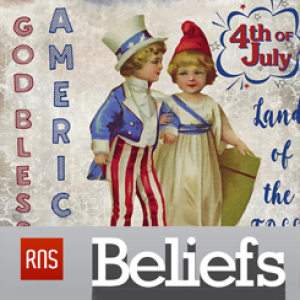
Sunday Jun 23, 2019
God Bless America: The Theology Of The Fourth Of July
Sunday Jun 23, 2019
Sunday Jun 23, 2019
Independence Day gives us another opportunity
to reflect on the ideological tug-of-war of religious freedom in America.
The Declaration of Independence is our topic today.
What can we make of the four references to god in the text?
Should we listen?
Our guest is author and academic Ira Stoll.
He's the author of the books - Samuel Adams: A Life, and JFK, Conservative.
He's also the managing editor of Education Next -
An education policy journal published by
Harvard's Kennedy School of Government.
Ira Stoll joined Beliefs producer Jay Woodward from his office in Boston.

Saturday Jun 15, 2019
Equal or Complementary? Gender roles in faith traditions.
Saturday Jun 15, 2019
Saturday Jun 15, 2019
An old debate resurfaces around this year’s Souther Baptist Convention. Complementarianism is a theological view that men and women fulfill separate and complementary roles in life.
Central to these conversations is renown Bible teacher Beth Moore.
Pastor? Teacher? Preacher? Disobedient? What kind of complementarian.
Emily McFarlan Miller is a national reporter for RNS based in Chicago. She covers evangelical and mainline Protestant Christianity. She joined Beliefs producer Jay Woodward to see what people are saying about complementarianism today.
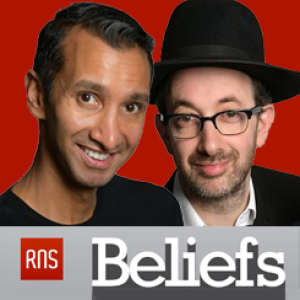
Sunday Jun 09, 2019
Sunday Jun 09, 2019
As they will tell you - two great comedians and two great religions come together in a stand-up comedy show that doesn't pull punches... and they swear that's what gives the show power and mission.
Ashley Blaker and Imran Yusuf are united in their devotion to God and Comedy. Of self-awareness and observation.
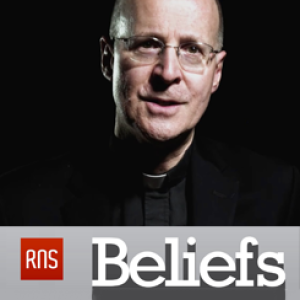
Sunday Jun 02, 2019
LGBT Catholics: Inclusivity and the Catholic Church with Fr. James Martin SJ
Sunday Jun 02, 2019
Sunday Jun 02, 2019
Jesuit Priest Father James Martin. A thoughtful and respected voice in the Catholic Church.
He’s the author of the book, Building a Bridge: How the Catholic Church and the LGBT Community Can Enter Into a Relationship of Respect, Compassion, and Sensitivity.
Known for his progressive theological views on a variety of subjects, he has turned his attention to homosexuality. Father Martin is a passionate advocate for embracing a community often shunned by the Church.
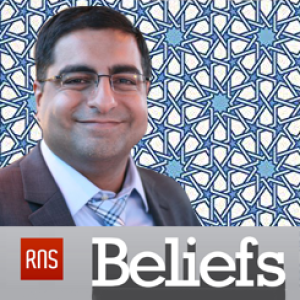
Sunday May 26, 2019
Sunday May 26, 2019
The Holy month of Ramadan is marked by a well-known 30 day fast from sunup to sundown.
When the sun goes down the fast is traditionally broken with water and three dates.
To tease out some deeper meaning behind this rigorous and difficult ritual fast,
Beliefs producer Jay Woodward sat with Dr. Hussein Rashid, Islamic scholar and educator.
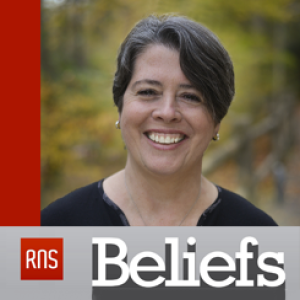
Sunday May 19, 2019
The Simplicity, Humanity, and Community Imperatives of Quaker Faith
Sunday May 19, 2019
Sunday May 19, 2019
Quaker Friends have been meeting and worshipping in America since 1656. The religion is defined by its emphasis on a personal relationship to the Divine; and to each other.
Our guest this week is Climate Justice Activist and Author Eileen Flanagan speaking on how her Quaker faith became the engine that propelled her into a career as an international environmental activist.
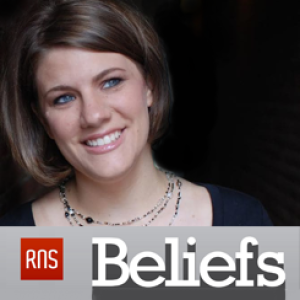
Sunday May 12, 2019
Contemplating the loss of Rachel Held Evans
Sunday May 12, 2019
Sunday May 12, 2019
The past week began with a tremendous loss. The funny, generous, and spirited Rachel Held Evans passed at the heartbreaking age of 37. Held Evans was an influential Christian author and speaker who challenged traditional thinking in evangelical spaces. Today on Beliefs we’re listening to stories about her influence, her magic, and her impact on Christian life.
Our guests are
Aaron Monts, a pastor from United Church in Seattle, WashingtonJana Riess - Senior Columnist at Religion News Service, and Brian Estrella, senior pastor at Evangelical Covenant Church in Riverside, Rhode Island.
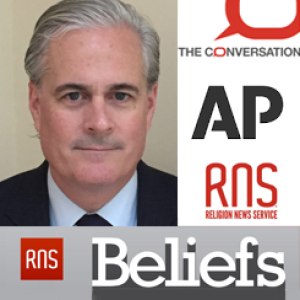
Saturday May 04, 2019
Religion Journalism Into The Future: Tom Gallagher and global faith reporting
Saturday May 04, 2019
Saturday May 04, 2019
Our guest is Tom Gallagher, Publisher and CEO of Religion News Service – and the Beliefs Podcast.
This week Religion News Service announced a partnership with the Associated Press and The Conversation. Their mission is to create a joint global religion news desk. Tom joined me to discuss the effort and what it means for religion reporting worldwide.
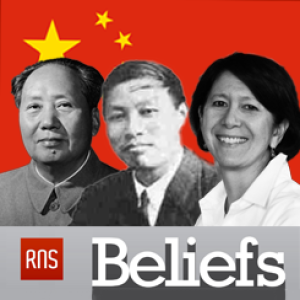
Sunday Apr 28, 2019
Christianity in China: Five generations of worship and struggle
Sunday Apr 28, 2019
Sunday Apr 28, 2019
Shanghai Faithful by Jennifer Lin is a chronicling of the emergence of her family's Christian identity in post-revolutionary China. Five generations of the Lin family worship and pray through a remarkable change in the world’s most populous nation.
This interview was edited for clarity.
Jennifer, welcome.
Thank you Bill for inviting me to your show.
Tell me how all of this started… How did you begin the massive research of your family in China and tell us about their faith and and their story.
I can actually pinpoint Bill the precise moment where this odyssey began. It was 1979.
My father is Chinese. He was raised in Shanghai and he was part of the great diaspora of Chinese who left China at the tail end of the Civil War when it became obvious that the Red Army would be successful. He left China in 1949 in 1979. It was just after President Carter had normalized relations with China and it became very easy for families like ours to travel back to visit relatives. So, my dad was able to go back to Shanghai to see the sister and the brother who stayed behind.
The first morning in Shanghai when I woke up, I was in my father's family home. I will never forget the look on my father's face when he came down the steps. He turned to me and he said, 'My God this is so depressing.' What happened is the first night we went to bed, my father's uncle pulled him aside. He said to him, 'Do you have any idea what has happened to us since you've been gone?'
And the truth of the matter was my father was clueless. This one uncle started to tell my father what happened to his parents during the Cultural Revolution. This was a very brutal period in Chinese history. It was 10 years of anarchy. Society turned on its on certain groups of people. If you were a capitalist if you were educated. If you had western ties, you were described as being an enemy of the people.
And this happened to my grandparents. And for my grandmother in particular, life was very difficult. Her brother was a very prominent religious leader in China. His name was Watchman Nee and to this day people still read his books. There are millions of followers around the world [and he] was declared an enemy of the people. In China during the Cultural Revolution - it was guilt by association. For my grandparents it was very difficult.
My grandmother was tormented persecuted on a daily basis - treated as a pariah by her neighbors. My grandfather was an Anglican priest. He was accused of being an American spy. For the family it was very difficult and my father was only learning this during that first night of our first trip to China in 1979.
I was a reporter for four decades for the Philadelphia Inquirer, so I just used my reporting skills to begin peeling back the layers. What was it about Watchmen Nee - this religious figure, that made them such enemies of the people?
Once I figured out that question, I just had more and more questions. One of the things that really intrigued me was the fact that both of my grandparents were third generation Christians. I began to really wonder you know how unusual that was like that in a culture like China which is steeped in its own philosophies and religions. Why would anyone back in the late eighteen -hundreds turn to Christianity?
I kept getting pushed further and further into the past. I needed to know, who was the first [to convert]? Why did they convert to Christianity? This was like a 40-year odyssey to try to figure out the answer to all these questions. At some point, like in the past six years I guess, I sat down to start writing their story and that's what Shanghai Faithful is it's answering all those questions. It's a look at the Lin family going back to the very first convert in the family. He’s a character I call old Lin who was really just an uneducated fisherman in the province of Fujian.
And through my family someone can really understand the evolution of Christianity in China, in particular because of my grandfather, the Anglican priest and my great uncle Watchman Nee, who again was one of the most prominent Christian religious figures in China in the 20th century.
He was not associated with any of the denominational mission churches. He very much led what is called an indigenous church movement in China. He was really at the vanguard of the whole house church movement. Watchman Nee spurned the denominational churches. He did not want to be aligned with the Anglicans or the Presbyterians, or anyone. He was building a kind of a grassroots Chinese religious movement. And they didn't build churches with steeples and crosses. They met in houses. Hence the house church you know phrase.
And that's how they would congregate as like-minded religious people.
So these Christian house churches all over China develop, kept operating even though they were technically outlawed and viewed as crimes against the people, and conspirators etc.. How many of them were there? How long did they go on? They are still going on today is that correct?
So Watchman Nee was very active in the 1930s and 1940s in China. In 1949 when China became the People's Republic of China, a communist nation, at that time there were an estimated 80000 people who were followers of Watchman Nee. They were in house churches all over the country in every major city. When China became a communist nation, the government the regime tried to assert control over churches and they were required to register with the government.
There were many that didn't want to do that. Many were the house churches. They were always kind of operating kind of beneath the radar. Watchmen Nee was arrested in 1952. He was sent away to a labor camp in 1956 died there. The house churches had to go underground in the 50s and the 60s during the Cultural Revolution. Though - all churches were closed, not only Christian churches and Catholic churches, but also mosques and temples.
Everything was shut down. They didn't start to revive the churches until 1979. I was actually in China then. In June when the news came out there were those who were still very suspicious of the government.
I mean today you can go to a Chinese city and there are house churches in hotel ballrooms or in offices. They're not as secretive as they used to be but there are house churches all over China. Some of them have just a few followers, and some of them have hundreds. There's a real struggle in China today between the house churches and the Chinese government which would like for all churches to be registered. Many of the people who are aligned with the house churches really push back against that.
There’s tension in China today. You know there are new rules and regulations for churches and the government would like to assert more control over all churches - including house churches. It’s hard to see how many house churches are because there are because no one really knows, but you can go really to any Chinese city or town and you'll find house churches.
The expectation after the Cultural Revolution where religion was basically outlawed was that religion - when it did come back, really wouldn't come back. Nobody would care. It's been a surprise. There really is kind of a rebirth and fast growth of religion particularly Christianity.
What happened in China is during the 1980s Chinese society was just undergoing a tremendous revival. All aspects of society. There was a great economic boom. People were told: to be rich is glorious. That was the motto, but as time went on over the decades, people began yearning for something more. There was a vacuum in their spiritual lives. People worshipped Mao, and after Mao died in 1976 there was this this vacuum created and people began turning more and more to religion.
There was a real flourishing of not only Christianity but all religions. Interest in Buddhism, interest in the philosophies of Daoism and Confucianism. It's the eternal man's search for meaning in their lives.
There's not like there's a Presbyterian church or Methodist Church. They're just “Christians” and no one really knows how many. It is estimated that it could be close to 100 million Protestants and Catholics in China. There are some people who estimate that in the next decade the number could actually double to 200 million.
Tell us about your grandfather the Anglican priest.
My grandfather Lin Pu-chi was a third generation Christian and he went to a mission school.
The missionaries knew they had a problem in China because if Christianity was really going to take root and flourish, the church needed Chinese clerics. My grandfather was sent to Philadelphia in 1918 to attend the Episcopal seminary there. He returned to China in 1920 and began working for the Anglican Church. So he was just what the church needed: an educated Chinese cleric.
And in 1927 there was there was something called the northern expedition. It was when the Communists and the nationalists were trying to battle the war lords to bring unity to China. But this was also a period of a lot of anti-foreign sentiment. There was an incident in March of 1927 where some of these communist anti foreign agitators were holding a protest.
It was a mob and my grandfather unfortunately was seized and paraded through the streets of Fuzhou.
They tied his hands and they dragged him through the streets like a dog on a leash. They had a dunce cap on his head and a placard on his chest that said ‘Running Dogs of the Foreigners’. They were trying to bully him into renouncing his faith, but he refused.
And what was really interesting is no one in my family knew this story. No one - not my father not his relatives in this story would have been lost to history if I hadn't stumbled upon it.
What happened to your grandfather after he refused to renounce his faith?
The mob gave up. They finally let him go. He continued to try to do his work, but Fuzhou was a much smaller city than say Shanghai. And he was really a marked man. There was another incident two years later where again another anti-foreign, anti-Christian mob attacked him, so he moved the family to Shanghai in 1932 and went to work for a and became principal of the school.
So, he moved on.
I assume these house churches are a powerful experience. Have you witnessed any of them?
When I was doing my research, I went to Fuzhou. because that’s not only where my grandfather came from, but also Watchman Nee and I wanted to try to gauge their legacy. A cousin of mine actually took me to a house church in an apartment in Fuzhou. What was very interesting is that the people who were there still read the books the writings of Watchmen Nee. They still sang the hymns that he had written.
Jennifer Lin, thank you for the story. Thank you for the book. The book is called Shanghai Faithful.
Thank you Bill, for giving me the opportunity to tell you about my family.
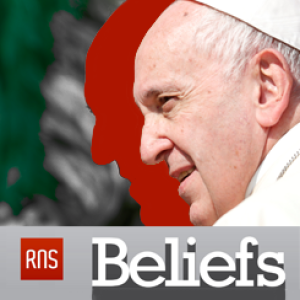
Sunday Apr 21, 2019
Bergoglio to Francis: The Election of A Pope With Author Gerard O'Connell
Sunday Apr 21, 2019
Sunday Apr 21, 2019
A book coming out this month takes us through the play-by-play of the election of Cardinal Jorge Bergoglio to the papacy. Upon election, he became the first Latin American pope, the first Jesuit pope, and the first pope to choose the name Francis.
America Media’s Vatican Correspondent Gerard O’Connell is Bill's guest. Talking about his remarkable account of the election of Pope Francis.
